Meera Senthilingam
This week, something strange is going on, and Helen Scales investigates why.
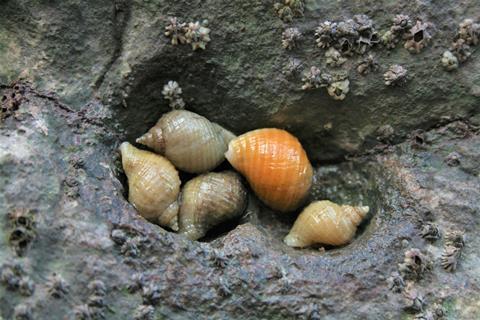
Helen Scales
In 1970, marine biologist Stephen Blaber made an unsettling discovery on beaches around the British Isles. He had been collecting sea snails, known as dog whelks, to try and find out why they were disappearing from their normal range. Blaber examined female whelks and saw that something very strange was going on: they were sprouting male genitalia. The females still produced eggs but in many cases their new penis was so large it blocked the oviduct and prevented eggs from being released, effectively making them sterile.
This was one of the first known case of a condition called imposex, so called because the male sex is imposing itself on females. It took another decade for researchers to pinpoint the cause of this strange phenomenon.
The culprit turned out to be tributyltin or TBT – a group of compounds that consist of between one and four organic components attached to a tin atom via carbon–tin covalent bonds. On its own, TBT is unstable and is usually combined with another element such as oxygen to form tributyltin oxide. There is also tributyltin benzoate, chloride, methacrylate, and plenty more.
Since their discovery in the 1950s, TBTs have been widely used as preservatives and disinfectants such as slime control in paper mills and to prevent clear plastics from turning yellow.
The link between TBT and whelks was made when surveys revealed that imposex was most common on beaches close to boat harbours and busy shipping lanes. Because the main use of these compounds was in anti-fouling paints.
A major problem for boats is when their hulls get smothered in sea life; barnacles, worms, shells and all sorts of other creatures have the tenacious habit of settling onto any hard surface they come by; this slows down boats, reduces their efficiency and, since the dawn of diesel engines, pushes up fuel bills.
The more TBT that a female whelk is exposed to, the longer her penis grows
So for a long time people have hunted for ways to keep ships clear of unwanted hitchhikers – including shipworms (in fact a kind of seashell) that gnaw holes and sink ships. In the 18th century, boats were covered in a thin layer of copper; this works by reacting with seawater to form copper oxychloride that deters young marine creatures from getting a grip.
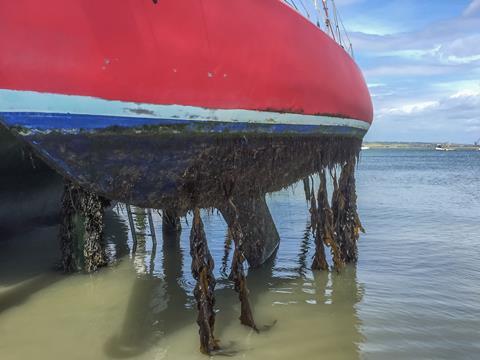
TBT is highly effective at warding off barnacles and other fouling species. When bonded to a polymer base it forms a self-polishing surface that continually releases the toxin by wave action or forward-motion through the water.
However, tests of water and sediments in the 1980s showed that TBT was leaching out of anti-fouling paints and getting into the environment where even at very low levels it can be toxic to a whole range of sea life.
As well as whelks, TBT causes problems throughout marine ecosystems, from microscopic plankton to huge whales. Imposex has been spotted in more than 150 other species of sea snail and it was discovered that TBT caused the collapse of oyster stocks in France. There is also evidence to suggest that, being soluble in fat, TBT accumulates in the food chain and can ultimately affect humans.
Exactly why TBT causes imposex isn’t completely understood. However, exposure to TBT is associated with a rise in testosterone levels suggesting that this androgen is somehow involved. What’s more, a dose of the anti-androgen, cyproterone acetate, blocks the affect of TBT and prevents the onset of imposex.
The puzzling thing is, as far as we know, whelks and all other molluscs don’t have androgen receptors in their nervous system: they can’t detect and respond to testosterone, at least not in any conventional way. So exactly how these molecules are picked up by whelks remains a mystery.
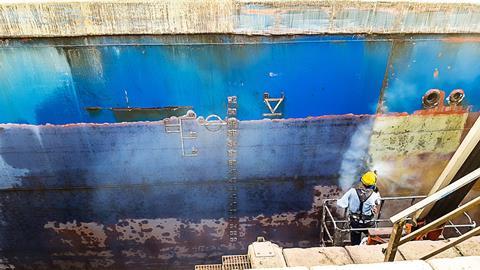
Female whelks were found to be so sensitive to TBT they were conscripted as an early warning system for the pollutant. Lab tests showed that imposex is triggered by concentrations of TBT as low as 3 nanograms per litre. And the effect is dose-dependent: the more TBT that a female whelk is exposed to, the longer her penis grows. This gave ecologists a useful tool for measuring the levels of TBT in the environment.
The good news for whelks, and the rest of the marine environment, is that since 2008 TBT has been banned as an anti-fouling paint under a global convention. So to keep their bottoms clean, boat owners now have to find an alternative to gender-bending compounds.
Meera Senthilingam
Science writer Helen Scales there, with the toxic and gender-switching chemistry of TBT. Next week, a new trend.
Nina Notman
Searching for items labelled ‘BPA free’ sold by the UK arm of the online retailer Amazon generates a whopping 16,561 hits. More impressive still when you consider that this phrase was only coined six to seven years ago.
Meera Senthilingam
Find out the origins of this bad reputation by joining Nina Notman in next week’s Chemistry in its Element. Until then, thank you for listening, I’m Meera Senthilingam.


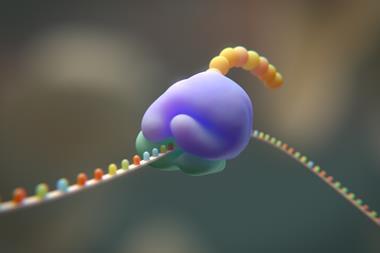







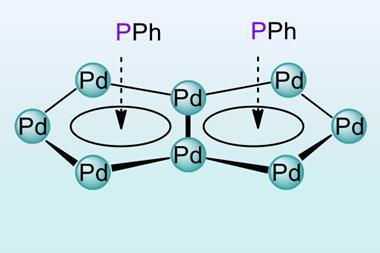



No comments yet